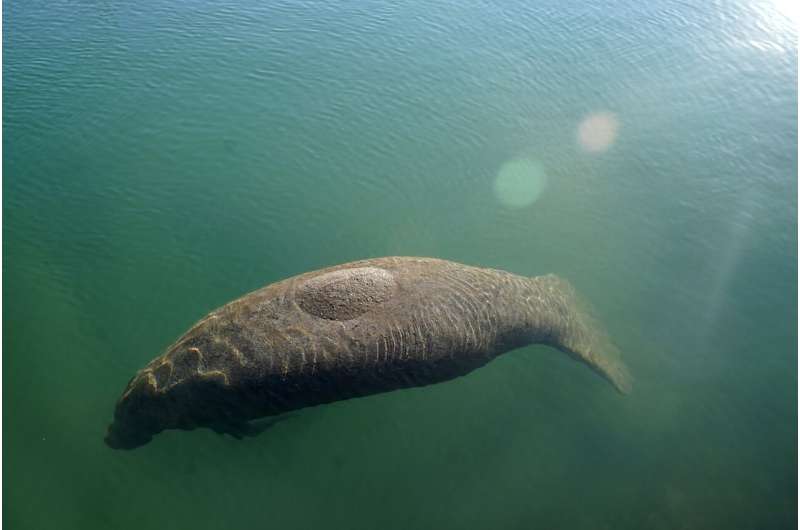A manatee floats in the warm water of a Florida Power & Light discharge canal, Monday, Jan. 31, 2022, in Fort Lauderdale, Fla. The SeaWorld theme park in Orlando is opening new pools to care for Florida manatees that are dying because of starvation due to poor water quality in their normal habitat. Credit: AP Photo/Lynne Sladky, File
The SeaWorld theme park in Orlando is opening new pools to care for Florida manatees that are dying from starvation due to poor water quality in their normal habitat.
The lovable, round-tailed marine mammals had their worst die-off last year, more than 1,100 of them, and there are federal and state efforts ongoing to save the threatened creatures. One of these efforts is to have a place like SeaWorld, with the marine assets it has, provide rehabilitation to those that can be rescued.
SeaWorld announced Friday that it has added five 40-foot (12-meter) pools to accomodate up to 20 manatees within two weeks. The theme park is one of five facilities in the U.S. taking care of sick and injured manatees. It had 28 manatees in its care as of Friday, according to a company release.
"We are bringing animals in that are skeletons. These animals need long-term care," said Jon Peterson, chief of zoological operations at SeaWorld who chairs a manatee rescue partnership with government agencies.
"We've got the space. We will continue to use that space," he added.
Manatees on the east coast of Florida, in particular, have suffered during winter months from a lack of food. They are large creatures that feed on sea grass, and poor water quality has reduced their natural food source, causing many to starve to death. It's mostly agricultural, urban and septic tank sources of pollution that are depriving them of food.
As of Jan. 28, 97 manatees have been found dead in Florida, according to the Florida Fish and Wildlife Conservation Commission, which has taken a leading role in the manatee rescue effort. Five of those were killed by boat strikes. Most of the rest are starving.
"That is the same pattern we had last winter, and these numbers will continue," said Dr. Martine deWit, the veterinarian who examines dead manatees for the state of Florida.
The Fish and Wildlife Commission and the U.S. Fish and Wildlife Service have embarked on an experimental attempt to feed manatees with romaine lettuce at a Florida Power & Light plant on the east coast. The animals typically gather there in winter months because of the warm outflow waters and at a time when there is very little natural food.
Recently, wildlife officials said there were more than 700 manatees in that area, although it's hard to say how many were eating lettuce.
"They are going to go where the food is," said Tom Reinert, South regional director at the Florida Fish and Wildlife Commission. "We hope to make a difference."
© 2022 The Associated Press. All rights reserved. This material may not be published, broadcast, rewritten or redistributed without permission.




















